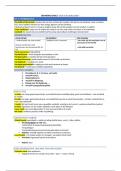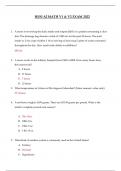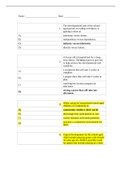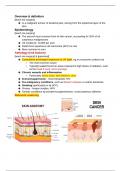Forum Selection
Deciding where to sue Forum selection= PJ+ Notice+ SMJ+ Venue
Remember: Assess SMJ on every claim filed in federal court
1. Personal Jurisdiction
Question: Can P sue D in this state? --Before P can initiate any lawsuit he/she must first determine which court(s) has jurisdiction
Jurisdiction : the authority to decide the dispute between the parties In order to enter a valid judgement (one that is enforceable) the court must have jurisdiction
Two types of jurisdiction: PJ and SMJ
Personal Jurisdiction : the ability of a court to exercise power over a particular defendant or item of property.
For personal jurisdiction to be proper :
1) The case must fall within the terms of a state statute; and 2) Jurisdiction must be constitutional If either of these are not met, t he judgement entered by the court will be void
and it cannot be enforced anywhere (its not entitled to full faith and credit in other
states and even the state that issued the judgment cannot enforce it).
NOTE: if the state statute is not met, no constitutional analysis is needed
PJ is a waivable right —you can waive PJ and consent to be sued anywhere
oQuestions concerning PJ only apply to the defendant oP can never object to PJ because they waived this right by filing suit in a court oBy invoking the authority of the court (filing suit), the plaintiff has consented to the power of that court to issue binding orders to her.
In Personam Jurisdiction : exists when the forum has power over the person of a particular defendant
•Such a judgment creates a personal obligation on the defendant and is entitled to full faith and credit in all other states
•In these cases, the court may render a money judgment against the defendant or may order the defendant to perform acts or refrain from acting. •If a defendant is ordered to pay a sum of money to a plaintiff, the plaintiff may enforce the judgment against the defendant’s property in any other state where that property is located. NOTE: In Personam Jurisdiction is always preferred Part one: Statutory analysis
1 For PJ to be valid, the case must fall within the state statute and jurisdiction must be Constitutional. Each state must enact legislation allowing its courts to exercise personal jurisdiction.
Is there a statutory basis for PJ? Step 1: flag whether there is a traditional basis listed in the statute. 1.Physical Presence at Time of Personal Service 2.Defendant is domiciled in the forum state (statute may say residence)
3.Service on an agent 4.Consent Step 2: Is there a long arm statute that allow jurisdiction over non-residents applies? (obviously non-residents because if they were domiciled here we would use that as the basis) oTwo Types: 1. CA type—one sentence long and it says we have jurisdiction to the full extent of the constitution oSo in these states, there is no real separate statutory step; you just do the constitutional analysis 2. Laundry list long arm (more common)—gives a list of things that the defendant (non-
resident) can do in this forum and by doing them, he subjects himself to specific jurisdiction
Sometimes, the same language is interpreted differently by different courts
(On the exam, you must argue this both ways)
Example: long arm jurisdiction over a non-resident who commits a tort in the forum
I manufacture widgets in state A. I sell a widget to you in state B. (This is a direct sale,
not a stream of commerce- I am availing myself of State B to sell it to you). You get the widget in state B and it explodes and injuries you.--You want to sue me in state B; I am a non-resident of state B, I reside in state A.
The state B statute says, we have long-arm jurisdiction over a non-resident who commits a tort in state B. Did I commit a tort in state B? Some courts say yes.
o(Gray v. American Radiator) The Illinois court has said that yes, I did commit a tort in state B because the injury was in state B—if the injury was in state B, the tort was in state B and the statute is satisfied oBut on exactly the same language, the NY courts said that there is no jurisdiction—
the statute is not met
I did not commit a tort in state B because I didn’t do anything in state B
To the extent that I was negligent, that was in state A where I manufactured the widget
Step 3: If the statutory basis was arguably met, there also needs to be a constitutional
analysis.--
Part two: Constitutional Step 4 : start by flagging whether there are traditional bases 1.Physical Presence at Time of Personal Service - where the defendant is present in the forum state and is personally served with process in the forum state, no matter how long he was present (i.e., even if just passing through)---Burnham
a.Narrow Exceptions: Even though personal service in forum state requirement 2 met, there are limitations.
b.If P brings D into forum state by fraud or force to serve process, most courts will
find the service invalid.
i.Immunity of personal jurisdiction to nonresidents of a forum state whose only purpose of being the state is due to judicial proceedings in that state or elsewhere
2.Domicile: Where the defendant is domiciled in the forum state, even if defendant is not physically wthin the state when served with process
3.Consent: Where the defendant consents to jurisdiction, whether express or implied, or
through the making of a general appearance
a.Express consent – express consent whether given before or after suit commenced, is a sufficient basis for PJ
i.Carnival Cruise lines v Shute – Shutes took cruise, and on back of ticket, there was a forum selection clause for Florida jurisdiction for any disputes arising. Issue is whether the forum selection clause is enforceable. It is a form contract, non-negotiated. Court says it is permissible because not made in bad faith ( i.e. to discourage potential plaintiff from filling a suit), and it is fair since Carnival primarily does business in FL. Court says clause benefits because otherwise potentially suits from all over, eliminates uncertainty, avoids costly pre-trial motions, and lowers cost of fare because litigation costs are lower. Dissent says there is unfairness in
the unequal bargaining power.
b.Implied consent: when the state has substantial reason to regulate the in-state activity of a nonresident of the state, it may provide that by engaging in such activity, the nonresident thereby appoints a designated state official as his agent for service of process
i.Hess v. Palowski (1927) - Court allows to expand consent to include implied consent. A state can legislate that a nonresident motorist using its highways be deemed to have appointed a local official as his agent to receive service of process in any action growing out of the use of the vehicle within the state
c.Voluntary Appearance – i.e., by contesting the case without challenging personal jurisdiction, becomes subject to PJ
i. By making an "appearance" in response to a lawsuit a defendant is in effect submitting to the jurisdiction of the court and waiving any defects, if any, in personal jurisdiction. In most states a defendant who wishes to challenge jurisdiction may do so by making a special appearance which is limited to the issue of jurisdiction. If he or she raises any other issues or claims he has made a general appearance and waives any defects in jurisdiction. ii.In federal courts no special appearance is necessary. Jurisdiction may be challenged in a motion or included as a defense in the answer.
4.Service on an agent If there is a traditional bases address the court split and then move on. If not, continue to the International Shoe analysis (There is 4-4 split within the court as to whether a traditional bases by itself is sufficient.)
Burnham:
Raised the question of whether a traditional basis by itself is sufficient or whether you 3 must also apply International Shoe test —there is a 4-4 split.
8 Justices agreed that there was general jurisdiction. However, we have a 4-4 split
as to why there was general jurisdiction.
Scalia- 4 justices: the traditional basis of presence when you are served process is sufficient on its own because of its historical pedigree. Justice Brennan (4) – historical pedigree is not relevant and we instead must assess the minimum contacts as present in Shoe.
osaid Mr. Burnham had voluntary availed himself for 3 days, which resulted in General Jurisiction.
oWe must apply the International Shoe test, because International Shoe replaced the traditional bases NOTE: What might matter for Justice Brennan is voluntariness of being present in the forum. For example, consider a flight ending up in a state. Under the Brennan approach you must always do the International Shoe
analysis
International Shoe requires that the defendant have “such minimum contacts” with the forum that the exercise of jurisdiction would be fair and reasonable. In considering whether there are such contacts, a court will look to two factors: 1. Purposeful availment 2.Forseeability
Step 5: Did the defendant’s contact with the forum result from D’s purposeful availment with that forum?
The contact between defendant and forum must result from the defendant’s act.
The defendant must have reached out to that forum in some way--ie. soliciting business there, making money there, using the roads there, etc
The court must find that through these contacts the defendant purposefully availed herself of the privilege of conducting activities within the forum state, thus invoking the benefits and protections of its laws.” The contacts cannot be accidental. The contact between the defendant themselves and the forum must be from something that the defendant did (the defendant’s purposeful availment), the contact cannot be the act of someone else For example, in Worldwide, the car got to Oklahoma because the plaintiffs drove it there.
oTherefore, there was no purposeful availment and thus no contact or PJ oPurposeful availment is an act by the defendant not the unilateral act of a third party Purposeful availment can however exist (and thus the defendant can be sued) when a defendant caused an effect in a certain state EXAMPLES:
Calder: The Court in Calder found specific in personam jurisdiction based on intentional aiming of harmful conduct at a forum State. oThose people in FL reached out to CA sources, they used CA sources, their article was aimed at the P in CA, and it was aimed at harming her in her business in CA--
so there was purposeful availment
Walden : The Court in Walden however found that there was no personal jurisdiction 4








